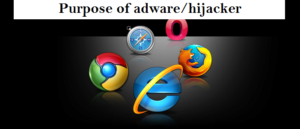Don’t Fall for the INTERNATIONALE SPANISCHE ONLINE-LOTTERIE Email Scam
INTERNATIONALE SPANISCHE ONLINE-LOTTERIE Email Scam Outline
Beware of the “INTERNATIONALE SPANISCHE ONLINE-LOTTERIE Email Scam,” as our investigation has revealed it to be a phishing campaign aimed at deceiving recipients into divulging sensitive personal information. The deceptive email claims that the recipient won a prize from the EuroMillionen (EuroMillions) transnational lottery several years ago, and due to corruption, the prize was not paid out at the time. The email suggests that the recipient can now claim the prize.
It is crucial to emphasize that this email is not associated with any legitimate lotteries or entities. The email, written in German and with the subject “ACHTUNG: ABSCHLIEßENDE MITTEILUNG FÜR DIE ZAHLUNG,” includes an attached PDF document containing identical text.
According to the email, the recipient is informed that a law firm, supposedly appointed by the Spanish “Office of Unclaimed Prize Funds,” has identified them as a winner who hadn’t claimed their prize for several years. The letter claims that the recipient was randomly selected through an online process involving names and email addresses. The initial notification of the win was allegedly hindered by corrupt bank officials attempting to steal the prize money, though the theft was unsuccessful.
The email further states that the prize money, a sum of €1,540,220, has been deposited in the Bank of Spain. The recipient is urged to contact a German-speaking lawyer from the law firm for legal advice on claiming the prize through a bank transfer, cash check, or ATM card.
However, it’s important to note that all these claims are false, and the email is not associated with legitimate entities such as the EuroMillions lottery, Loterías y Apuestas del Estado, or the Bank of Spain.
The phishing email seeks victims’ personally identifiable information, requesting a copy of their passport or ID card. Additionally, recipients are asked to “reconfirm” various personal details, including full name, birthdate, occupation, address, country, phone number, email address, bank name, and banking account number if the recipient wishes to receive the supposed winnings via a bank transfer.
Providing this information to cybercriminals poses severe risks, as they can use it to steal identities and engage in various malicious activities, including financial fraud.
If you have already disclosed your personal data to the scammers, it’s imperative to take immediate action. Contact the appropriate authorities and inform them of the situation to mitigate potential privacy issues and financial losses. Stay vigilant, be cautious of unsolicited emails, and refrain from sharing personal information unless certain of the legitimacy of the request.
Message in the Spam Letter:
INTERNATIONALE SPANISCHE ONLINE-LOTTERIE / EURO-MILLIONEN-JACKPOT LOTTO
C/ Bernardino Obregón 25 28012 Madrid Spanien
Achtung: Offizielle Mitteilung,
Sehr geehrte Damen/Herren, Begünstigter 03.11.2023
Referenznummer: 0001/2005/KSBLP/2023
Abschließende Mitteilung Für Die Zahlung Des Nicht Beanspruchten
Wir möchten Sie darüber informieren, dass das Amt für nicht beanspruchte Preisgelder in Spanien unsere Anwaltskanzlei damit beauftragt hat, als Rechtsberater bei der Bearbeitung und dem
Auszahlung des Preisgeldes, das Ihnen gutgeschrieben wurde und nun schon seit mehreren Jahren nicht mehr beansprucht wurde. Wir sind Direktoren des Spanischen Internationalen Lotteriebüros und
Das Finanzministerium und einige andere relevante Ermittlungsbehörden hier in Spanien haben unseren ausländischen Zahlungsabwickler, die spanische Zentralbank, angewiesen, Ihnen eine Bestätigung der Zahlungsanweisung zu senden.
ZAHLUNGSMÖGLICHKEIT: (A) BANKÜBERWEISUNG (B) BARSCHECK (C) ATM-KARTE
Wir möchten Sie informieren, dass das Büro des nicht Beanspruchten Preisgeldes in Spanien, unsere Anwaltskanzlei ernannt hat, als gesetzliche Berater zu handeln, in der Verarbeitung und der Zahlung eines Preisgeldes, das auf Ihrem Namen gutgeschrieben wurde, und nun seit über zwei Jahren nicht beansprucht wurde.
Der Gesamtbetrag der ihnen zusteht beträgt momentan €1.540.220,00 EUROS
Alle Teilnehmer wurden nach dem Zufallsprinzip von der World Wide Website ausgewählt, indem ihre Namen und E-Mail-Adressen mithilfe eines Computersystems von mehr als 100.000 Unternehmen auf der Website der Welt extrahiert wurden. Wir möchten sie darauf hinweisen, dass die Lotterie Gesellschaft überprüfen und bestätigen wird ob ihre Identität übereinstimmt bevor ihnen ihr Geld ausbezahlt wird
Im Laufe unserer Untersuchung haben wir mit Bestürzung erfahren, dass Ihre Zahlung unnötigerweise durch korrupte Bankangestellte verzögert wurde, die versuchten, Ihr Geld auf ihre Privatkonten umzuleiten. Wir möchten Sie darüber informieren, dass Ihre nicht eingeforderte Zahlung in Höhe von €1.540.220,00 (Eine Million Fünfhundertvierzigtausend Zweihundertzwanzig Euro) Ihr Geld war noch bei unserer Zentralbank hier in Spanien hinterlegt und wir werden sie beraten wie sie ihren Anspruch geltend machen.Bitte setztzen sie sich dafuer mit unserer Deutsch Sprachigen Rechtsanwaeltin in Verbindung JOSE FERNANDO (TEL/FAX: +34-687-173-102) E-MAIL:- [email protected] Senden Sie ihm die folgenden Informationen für die Zahlung.
Wir wurden von der spanischen Zentralbank angewiesen, Ihnen das gewonnene Preisgeld schnellstmöglich auszuzahlen. 1.540.220€ = Eine Million Fünfhundertvierzigtausend Zweihundertzwanzig Euro.
Wir entschuldigen uns aufrichtig für die Unannehmlichkeiten, die Ihnen in den letzten Jahren entstanden sind.
Vielen Dank für die Einhaltung dieser Anweisung und noch einmal Glückwünsche.
Wir empfehlen Ihnen, Ihre folgenden Informationen unten erneut zu bestätigen und unseren Anweisungen unverzüglich Folge zu leisten;
Bitte füllen Sie Das form und E-mail es mit Kopie Ihres Reisepasses Oder Personalausweise Sofort zur für Bestätigung und den Prozess
ZAHLUNGSMÖGLICHKEIT: (A) BANKÜBERWEISUNG (B) BARSCHECK (C) ATM-KARTE
(BANKDATEN SIND NUR ERFORDERLICH, WENN SIE DIE ÜBERWEISUNG AUSGEWÄHLT HABEN
(1).VOLLSTÄNDIGER NAME: ___
(2). GEBURTSDATUM: ___
(3). ADRESSE: ___ LAND: ___
(4). TELEFON: ___ MOBIL:___
(5). BERUF: ___ (6). EMAIL ___
(7). BEITRÄGE: ___ (8). REFERENZ NR: ___
(9). BANK NAME: ___ KONTONUMMER: ___ BANKLEITZAHL: ___
Mit freundlichen Grüßen,
MIGUEL GONZALEZ
GESCHÄFTSFÜHRER
In terms of email-based cyber threats, what are the different types of malicious emails?
Emails having Malicious Attachments
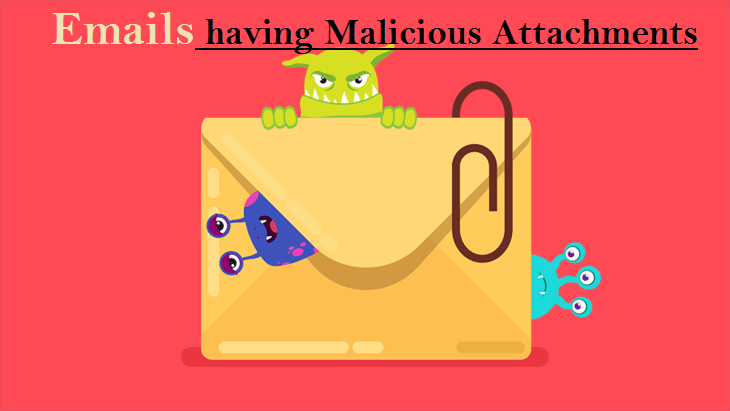
Email spam containing malicious attachments is a commonly employed method by cybercriminals to compromise users’ computers with malware. Malicious attachments often harbor trojans that possess the ability to pilfer sensitive data such as banking details, passwords, and other confidential information.
The primary objective of cybercriminals in these attacks is to deceive their potential victims into accessing a compromised email attachment. They commonly employ email messages that discuss recently obtained invoices, faxes, or voice messages to accomplish this aim.
If an unsuspecting individual succumbs to the trap and opens the attachment, their computer becomes infected, allowing cybercriminals to gather a substantial amount of confidential data.
Although it is a more intricate technique to pilfer personal data (as spam filters and antivirus programs typically identify such endeavors), if cybercriminals achieve success, they can access a broader spectrum of information and continue accumulating data over an extended duration.
Phishing Emails

Typically, cybercriminals employ deceitful emails to deceive individuals on the internet into divulging their confidential personal information, such as login credentials for diverse online platforms, email accounts, or online banking details.
These types of attacks are commonly known as phishing. In a phishing attack, cybercriminals typically send an email that mimics the branding of popular services like Microsoft, Amazon, DHL, or Netflix. They craft messages with a sense of urgency, such as incorrect shipping details or expired passwords, and include a hyperlink, hoping to entice unsuspecting recipients into clicking on it.
Upon clicking the provided link in these email messages, victims are redirected to a counterfeit website that closely resembles the legitimate one. In this deceptive environment, victims are prompted to enter their password, credit card information, or other sensitive data, which is subsequently harvested by cybercriminals for malicious purposes.
Spam Emails

Spam emails are unsolicited, bulk messages sent to a large number of recipients simultaneously. They often contain unwanted advertisements, scams, or fraudulent offers. The primary purpose of spam emails is to promote products, services, or websites, sometimes of dubious nature.
These emails can be sent by individuals or automated bots, and they often target a wide range of recipients without their consent. Spam emails can clog up inboxes, consume storage space, and pose risks such as phishing attempts or malware distribution.
Sextortion Emails
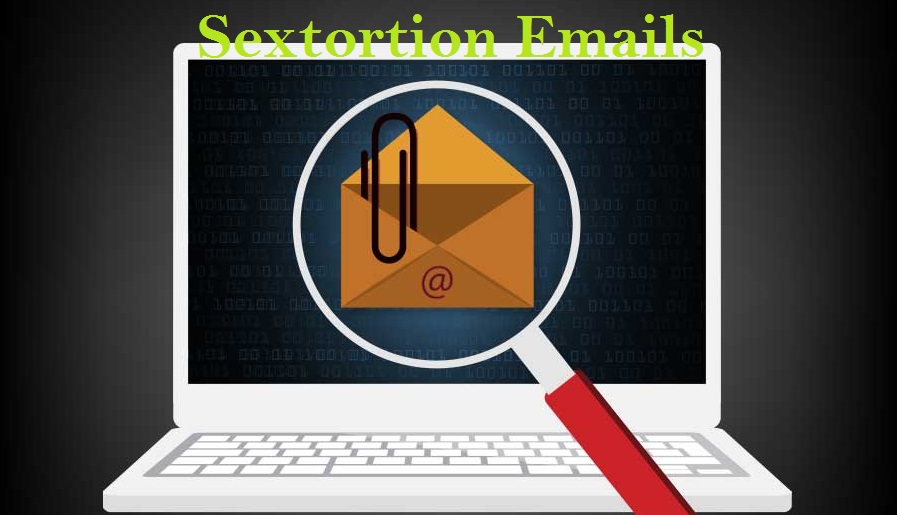
This type of email is a form of phishing known as a “sextortion scam.” It preys on individuals’ fears and attempts to blackmail them into paying a ransom. The scam email falsely claims that a cybercriminal has gained unauthorized access to the victim’s webcam and possesses a compromising video recording of them engaging in explicit activities.
The scammers leverage the potential embarrassment and shame associated with such content to coerce the victim into paying a ransom, often in the form of cryptocurrency, to prevent the release of the alleged video. However, it is crucial to understand that these claims are entirely false and fabricated.
What are some indicators or signs that can help identify a malicious email?
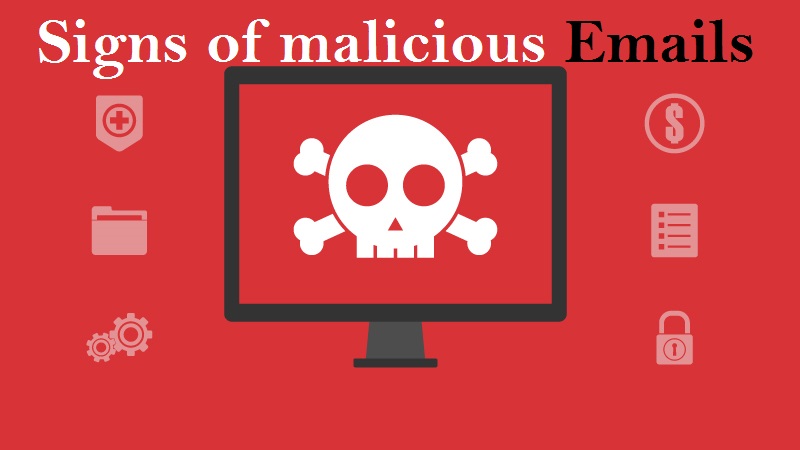
To spot a malicious email you can look for the following indicators:
Suspicious Sender: Check the sender’s email address and verify if it matches the official contact information of the organization or person they claim to represent. Be cautious of email addresses that contain misspellings, random numbers, or unfamiliar domain names.
- Poorly Written Content: Pay attention to grammar and spelling mistakes, unusual language, or poor formatting. Legitimate organizations usually maintain professional communication standards.
- Urgent or Threatening Language: Beware of emails that create a sense of urgency, pressure you to take immediate action, or threaten negative consequences if you don’t comply. Scammers often use fear or time-sensitive situations to manipulate victims.
- Suspicious Attachments or Links: Be careful of email attachments or links, especially from unknown or unexpected sources. Don’t open attachments or click on links unless you are confident about their legitimacy. Hover over links to see the actual URL before clicking.
- Requests for Personal Information: Legitimate organizations typically don’t request sensitive information, such as passwords, Social Security numbers, or credit card details, via email. Avoid providing personal data unless you are certain of the email’s authenticity.
- Unusual Requests or Offers: Be wary of emails offering unexpected rewards, prizes, or financial opportunities. If something seems too good to be true or doesn’t align with your normal interactions, it could be a sign of a scam.
- Suspicious Email Design: Poorly designed or visually inconsistent emails may indicate a scam. Watch for generic greetings, mismatched logos, or distorted images.
If you have doubts about an email’s legitimacy, it’s best to err on the side of caution. Avoid clicking on links or downloading attachments, and consider contacting the sender through a verified channel to verify the email’s authenticity.
What actions can be taken if you have fallen for an email scam?
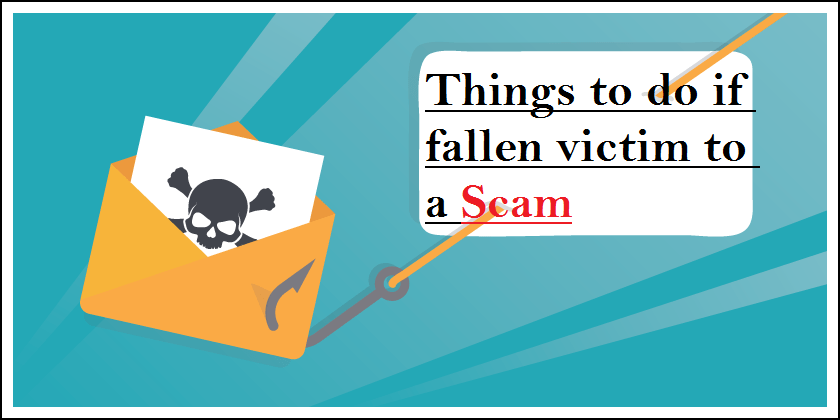
Below are the steps you should take if you’ve fallen prey to the INTERNATIONALE SPANISCHE ONLINE-LOTTERIE Email Scam.
- If you have mistakenly provided your credit card information after clicking on a link in a phishing email, it is crucial to immediately contact your bank and inform them about the situation. It is highly likely that you will need to take steps to cancel the compromised credit card and request a replacement for enhanced security.
- If you have inadvertently provided your password after falling for an email scam, it is essential to promptly change your password. Typically, cybercriminals gather stolen login details and sell them to other malicious groups for potential exploitation. By changing your password immediately, you reduce the likelihood of criminals having sufficient time to cause harm or unauthorized access to your accounts and information.
- If you notice any indications of identity theft, it is important to promptly reach out to the Federal Trade Commission (FTC). The FTC will gather information about your situation and develop a personalized recovery strategy.
- Assist in safeguarding fellow internet users by reporting phishing emails to organizations such as the National Fraud Information Center, Anti-Phishing Working Group, FBI’s Internet Crime Complaint Center, and the U.S. Department of Justice.
- If you have inadvertently opened a malicious attachment, it is likely that your computer has been compromised. To address this, it is advised to conduct a thorough scan of your system using a reliable antivirus software. We suggest utilizing SpyHunter 5 for Windows to help mitigate any potential threats.
⇓⇓Download Spyhunter 5 Free Scanner⇓⇓
Do make sure to read SpyHunter’s EULA and Privacy Policy. Spyhunter free scanner downloaded just scans and detect present threats from computers and can remove them as well once, however it requires you to wait for next 48 hours. If you intend to remove detected threats instantly, then you will have to buy its licenses version that will activate the software fully.
Frequently Asked Questions
Why was I included in the distribution of this email?
Phishing emails are often disseminated by threat actors through extensive campaigns, leading to thousands of recipients receiving comparable messages.
If I have viewed a spam email but refrained from opening the attachment, is there a possibility that my computer has been infected with malware?
Simply opening or reading an email does not pose a direct risk of malware infection. The actual threat arises when you interact with malicious attachments or links contained within the email, triggering potential malware download or installation processes.
If I downloaded and opened a file from a spam email, does that mean my computer is infected?
If the file you opened from a spam email was an executable file (.exe, .run, etc.), there is a high chance that your computer may be infected. However, if the file was a document format (.doc, .xls, .one, .pdf, etc.), the risk of infection may be lower as these formats usually require additional actions to initiate the download or installation of malware, such as enabling macros or clicking on embedded content.
If I have unknowingly shared your personal information in response to a deceptive spam email, what steps should I take to mitigate the potential risks?
If you have mistakenly shared your login credentials, it is crucial to change the passwords for all affected accounts promptly. Additionally, if sensitive personal information like identification documents or credit card details were disclosed, it is important to promptly notify the relevant authorities or organizations responsible for handling such incidents.
Is SpyHunter 5 capable of detecting and eliminating malware infections that may be present in email attachments?
SpyHunter 5 is powerful security software that is specifically designed to scan devices and effectively remove various types of malware infections. With its comprehensive scanning capabilities, it can detect and eliminate most known malware threats, including those that may be present in email attachments and pop-up notifications. Running a thorough system scan is crucial to ensure that all potential threats are identified and removed from your device.

